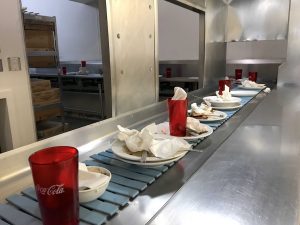By Alexandra Parker

Fordham students find themselves repeatedly using disposable silverware and plates when dishwasher breakdowns cause the Marketplace to temporarily switch to single-use flatwear. During the most recent incident, the culprit was the tray return belt, according to Deming Yaun, Fordham Dining Service contract liason, who said the most recent breakdown had the washer out of commission for approximately 10 days.
Yaun said the problem in this most recent case was the relay box, which short circuited after being splashed with water. He said the box was replaced and moved to a different spot where it is less likely to be splashed.
Yaun blamed the extended amount of time the equipment was down on the manufacturer the university uses.
“We get parts shipped overnight so that people can come in right away and do the repair,” he said. “The issue is the manufacturers and warehouses don’t stock and keep the parts in the way that they used to,” he explained.
This is not the first time the machine has had problems. Yaun says he estimates the conveyor belt has broken down at least five times in the last year for unrelated issues. Each time, the cafeteria must switch to disposable products, costing the university $10,000 a week.
Vice President Of United Student Government’s Sustainability Committee, Gabby Perez, FCRH ’21, said the waste this creates is unacceptable.
“When there’s plastic utensils and plates, I don’t go to the Caf…It’s the only zero waste dining option on campus.”
President of Students for Environmental Awareness and Justice, Lily Round, FCRH ’20, said that the university could be doing more.
“They don’t put out recycling bins,” she said. “They don’t even make it an option.”
Round added that perhaps the university should tackle the root of the problem.
“I think they can just invest in better infrastructure in general,” Round said. Just to make sure this problem doesn’t keep happening.”
Yaun says the university is not pursuing this option right now, as the machinery is only two and a half years old, and small replacements and repairs are much cheaper than a full replacement.
“It seems it’s too soon to be replaced. It is a six-figure number to replace the thing,” he said.
But Yaun said he understands that the situation is frustrating.
“You know, no one wants to eat out of paperware for such a long period of time.”
He says Dining Services has looked into other options to reduce waste, but the logistics are tricky. They attempted to hire extra staff to carry dishes from the belt to the dishwasher, but it is difficult to find people looking for temporary work.
“You’re hiring people for you don’t know how long… It’s hard to find people in that category who can be so flexible.”
Compostable utensils have also been discussed, but they come with a bigger price tag. They cost two and a half times more than plastic ones, according to Yaun. Additionally, they have a tendency to breakdown and dissolve over the course of a meal.
Perez and Round offered that perhaps students could help with temporary work loads.
“I know so many people who would be so willing to help… I’m always looking for a job on campus,” Round said.
“If you tell a student, ‘Oh I can give you a job for two weeks,’ they’d say ‘Yeah,’” Perez added.
Yaun says this is not an option Dining Services has explored before, but he is open to the idea.









































































































































































































